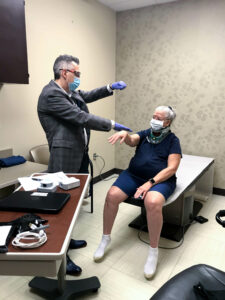by June Kinoshita, FSHD Society

When doctors diagnose individuals with a progressive condition like FSH muscular dystrophy (FSHD), they’re often asked, What does the future look like? Will I need to use an orthotic brace? How long do I have before I need to use a walker or a wheelchair? What about respiratory support?
While medical professionals can provide some general guidance, the truth is that we need more research to better predict how an individual might progress. That is the primary goal of a new study, Motor Outcomes to Validate Evaluations in FSHD (MOVE FSHD). Its aims are to create a standard, clinic-based protocol – techniques to assess patients’ health and muscle strength and function in the doctor’s office – which will help to improve care and hasten the development of treatments for FSHD.
The study’s principal investigators are Jeffrey Statland, MD, at the University of Kansas Medical Center (KUMC) and Rabi Tawil, MD, at the University of Rochester Medical Center. Their goal is to recruit 250 volunteers, who will be followed for at least three years. They began recruiting volunteers this August, beginning with their own centers and the four newest FSHD Clinical Trial Research Network (CTRN) sites: Stanford, University of Colorado, University of Florida, and University of Texas Southwestern. Additional recruitment will take place later this fall and in the winter of 2021 at the remaining six CTRN sites.
“This study will help us understand how large a change in outcome assessments would be clinically meaningful and help us know what baseline FSHD characteristics predict future motor or health outcomes,” explained Statland. Translation: How do changes in strength as measured by a doctor’s test, such as the Manual Muscle Test, correlate with a “clinically meaningful” change, such as the ability to climb a step? Which of the dozens of such measurements taken by your doctor help predict how soon you will need a walker or a BiPAP machine?
MOVE FSHD will be partnering with the Peter Jones lab at the University of Nevada, Reno, which is providing saliva methylation testing of study volunteers. “We’re creating a true collaboration where MOVE FSHD can help validate the saliva methylation biomarker and can help us better understand the predictors of motor and health outcomes,” said Statland.
Being able to answer such questions is not simply to satisfy scientists’ curiosity. Studies like MOVE FSHD are crucial for developing tools that can determine whether a treatment for FSHD is slowing or stabilizing the progression of the disease. Our greatest fear is that drugs that can actually slow the disease process will fail in clinical trials for lack of adequate measuring tools. That’s why it’s important for individuals with FSHD to volunteer in large numbers. The sooner the MOVE FSHD study can recruit the 250 volunteers it needs, the sooner we will have these critically important tools.
If you are interested in volunteering, please contact Michaela Walker at mwalker20@kumc.edu or (913) 945-9920.


Leave a Reply